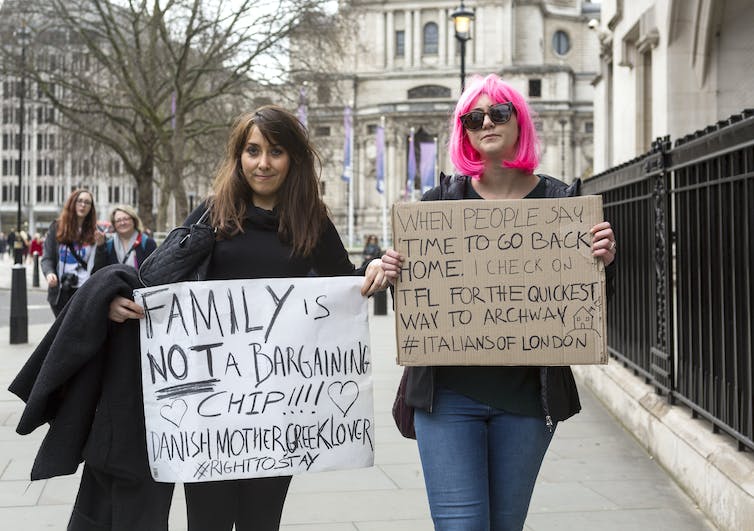Shutterstock/NicoElNino
Nicole and Hemmo have two youngsters. Our workforce visited them at residence just some days earlier than they moved to the Netherlands. Piles of packing containers crammed each room of the home, able to be shipped over the approaching days. Althought they’d lived within the UK for a number of years, Brexit pressured them to reassess the place their household’s future lay.
Nicole, who’s German and has two youngsters, advised us:
Leaving seems like a funeral, since you don’t realise what’s going to occur till too late, since you’re so busy with doing issues beforehand, getting ready for it after which as soon as it has occurred, you solely realise weeks and weeks later what you misplaced, what you’re lacking.
The complete household had agreed to go away the UK however selecting a vacation spot proved extra laborious, not least as a result of “going again residence” was not an possibility – a minimum of not for everybody on the similar time. Nicole is initially from Germany, her husband Hemmo is Dutch and her youngsters had been born within the UK.
Nicole’s household, like hundreds within the UK, embodied the EU aspiration of a pan-European citizenry, transferring throughout a number of nations and settling collectively in one other. These households needed to come to phrases with what the UK’s 2016 choice to go away the EU meant for them and their future.
But leaving was not often easy. Exit trajectories, our analysis just lately revealed in The Sociological Review reveals, are removed from linear. They usually require quite a few changes based mostly on the configuration of the household unit. Our research delves deep into these untold tales revealing a posh internet of hopes, challenges, sacrifices and entanglements.
Faced with diverging pursuits, wants and expectations, households who ultimately moved away from the UK attributable to Brexit pursued two predominant methods of accommodating their variations. Some sought to compromise spatially, negotiating and selecting a vacation spot that may go well with most relations.
“Going residence” was the principle selection for similar nationality households, though even for them, there have been a number of challanges to beat. This was notably the case for kids who had been born within the UK and had by no means lived within the nation of origin of their mother and father and weren’t fluent within the nation’s language.
For mixed-nationality households, the selection was usually guided by work alternatives and power of household networks, as within the case of Nicole and Hemmo.
Others sought to discover a answer temporally, planning the exit technique not as a one-off occasion however one thing going down over an extended interval. Some family members would to migrate first and the remainder of the household would be part of at a later stage.
When Brexit results in divorce
Our research reveals that these lodging weren’t all the time profitable. Diverging and or conflicting aspirations main in some instances to household breakups.
Maria, a French mom, advised us how the UK’s divorce from the European Union was the explanation she ended up divorcing her British husband. When Brexit occurred, Maria needed to speak about its penalties together with her husband, however he was not .
She then began to consider shopping for a spot in France the place she might really feel at residence, the place she might really feel protected. As she felt unsupported and dismissed, ultimately she determined to return to France alone and divorced her husband. She hoped that her grownup youngsters would need to be part of her sooner or later sooner or later however that’s removed from sure:
This is what Brexit is costing me actually. This is the most important factor. To pressure me to not stay in the identical nation as my youngsters and presumably to not stay in the identical nation as my future grandchildren as nicely, if they may quiet down within the UK, which seems pretty possible.
Maria’s story and the numerous others we collected present that going “residence” is less complicated stated than performed. Return journeys can expose intricate intergenerational tensions, challenges, and lodging, particularly for individuals who have had youngsters within the UK and don’t know every other residence.

EU residents had been usually seen protesting within the pre-Brexit years.
Shutterstock/Ms Jane Campbell
The experiences of the EU households who left Britain present how a significant political occasion akin to Brexit reverberates within the lives of actual individuals. Thousands of EU-born Britons who usually had lived within the UK for years now not felt welcome. Many of them ultimately left.
As Olga, a Polish girl with two UK-born youngsters, put it:
In the day of the referendum outcomes, my husband and I seemed by way of the window and realised that a minimum of half of these individuals had voted towards us. That’s the way it was. So, regardless of proudly owning a home within the UK, what else, having an exquisite job, in six months we determined to go away.
To lots of them, Brexit was a seismic occasion, and its aftershocks are nonetheless being felt after years, however their voices have hardly been heard within the public dialog on Brexit.
Read extra:
The UK’s island id has lengthy formed its political outlook – is that why it presently feels so adrift?
![]()
Nando Sigona has acquired funding from the Economic and Social Research Council for "EU households and Eurochildren in Brexiting Britain" (www.eurochildren.data) (ES/R001510/1).
Godin, M., & Sigona, N. (2023) 'Infrastructuring exit migration: Social hope and migration decision-making in EU households who left the UK after the 2016 EU referendum'. The Sociological Review, out there at https://doi.org/10.1177/00380261231194506
